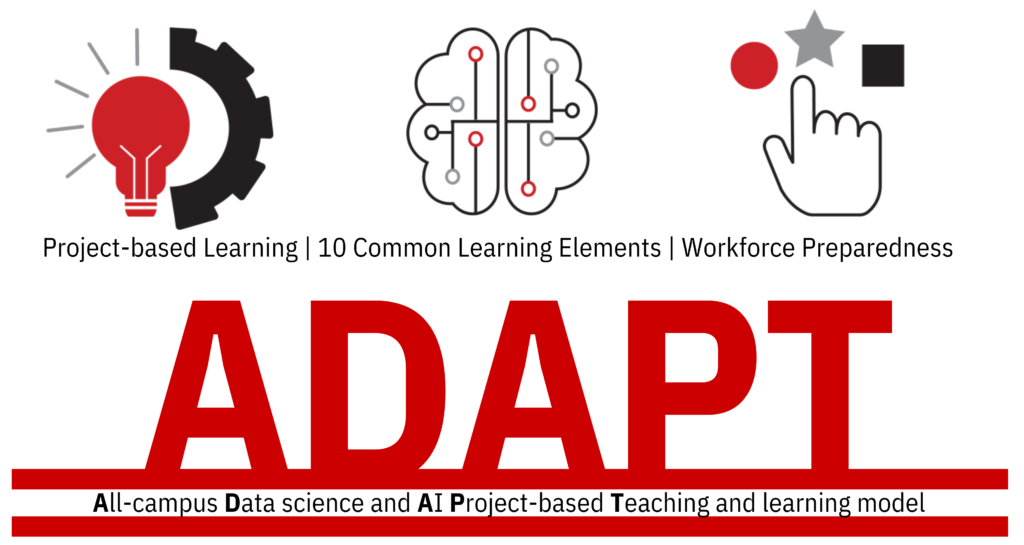
ADAPT Course Model
The Data Science and AI Academy designs and delivers instruction through the ADAPT model: All-campus Data Science and AI Project-based Teaching and learning model. Our courses are open to all learners and have included undergraduates, graduate students, faculty, staff, alumni and community members.

Project-based Learning
We prepare students for the future of work. Our courses have homework and projects, but no quizzes, tests, or exams. Projects may be an end-of-course capstone or build up through a series of assignments. We continuously engage employers to offer the skills needed in a rapidly changing job market. Students from all majors can find ways to engage with data science and AI, put ideas into practice, retain knowledge, skills, and abilities (KSAs) beyond the course, and apply learning in new contexts.
10 Common Learning Elements
Our courses include many topics taught by instructors and faculty from industry and academia. Though our instructors span many disciplines and areas of expertise, they all utilize common learning elements, which help them highlight connections across course topics and enable students to think and do across disciplines. The common learning elements are aspects of practicing data science and using AI at work. They include:
Data Perspectives
- Recognizing data as information – not truth – with error, variability, and missing information,
- Explaining what it means to be a data scientist and AI expert,
- Observing a variety of data scientist role models and careers.
Data Practices
- Examining how data are created, and the related assumptions and collection practices,
- Practicing data curation, wrangling, and cleaning,
- Assessing validity of data, methods, results, and communication,
- Employing design practices such as documenting work, considering whether broadband is required for applications, including color palettes that are visible to people who are color blind, adding captions to video and adding descriptive text to images,
- Investigating ethical issues and ways to approach them.
Data Discoveries
- Articulating current issues or open questions in data science, and
- Specifying exciting discoveries or impacts of data science.
Workforce Preparedness
We prioritize interdisciplinary learning experiences in which students have the agency to make genuine choices. In the workplace, data and AI practitioners will need to make decisions about which data to consider, which tools to use, and which questions to explore. We give students opportunities to become data and AI problem solvers by practicing decision-making in their homework and projects. Students from all majors across the university participate in our courses and apply data science and AI in their disciplines. They learn how to communicate about data and AI so that their work can be used and understood. We continuously adapt our courses to new technologies, new methods and models, and new employer needs.
ADAPT Data Science and AI Education Research
The Data Science and AI Academy has a robust educational research program with three funded research projects in progress:
- NC State Data Science Education Postdoctoral Fellowship funded by NSF
- NSF IUSE – Undergraduate Data Science Education Research
- Research Leads: Sunghwan Byun, Ela Castellanos-Reyes, Shiyan Jiang, Rachel Levy
- Data Explorers – K-12 Student and Teacher Education funded by COMAP
- Research Leads: Ruby Ellis
- NC Department of Health and Human Services Data and AI at Work
- DCDEE Pilot Courses
- Evaluation Leads: Gemma Mojica, Rachel Levy
- All DHHS Courses Sequence
- Evaluation Lead: Robin Jones, Rachel Levy
- 5-Year Train the Trainer Contract
- Evaluation Lead: Robin Jones, Rachel Levy
- DCDEE Pilot Courses
Want to conduct Education Research with DSA and the ADAPT model?
The DSA welcomes partners who would like to try the ADAPT model in their courses or curriculum development. To participate, contact datascienceacademy@ncsu.edu, attn: Dr. Levy.
We also collect examples of student work (IRB# 24315) for research purposes. If you would like to apply for permission to use DSA data in your research please submit this form at least 3 months in advance: DSA Ed Research Application.docx Please email questions to datascienceacademy@ncsu.edu, attn: Dr. Byun.